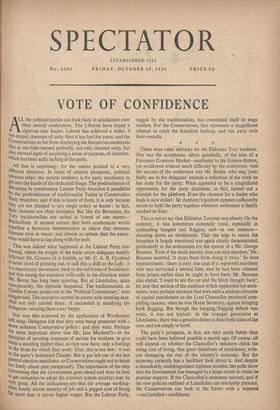VOTE OF CONFIDENCE
LL the political parties can look back in satisfaction over their annual conferences. The Liberals have found a vigorous new leader; Labour has achieved a wider, if not deeper, measure of unity than it has had for years; and the Conservatives, so far from displaying the fissiparous tendencies that at one time seemed probable, not only retained unity, but also showed signs of acquiring a sense of purpose, of direction. Which has been sadly lacking in the party.
All this is surprising : for the omens pointed in a very different direction. In times of relative prosperity, political tensions relax; the natural tendency is for party machinery to get into the hands of the dedicated fringe. The predominance of Bevanites in constituency Labour Party branches is paralleled by the predominance of traditionalist Tories in Conservative Party branches; and if less is heard of them, it is only because they are not pledged to any single policy or leader : in fact. their interests are often divergent. But like the Bevanites, the Tory traditionalists are united in hatred of one enemy- butskellism. It seemed certain that both conferences would Manifest a ferocious determination to cleave that tiresome Siamese twin in twain; and almost as certain that the execu- tives would have to tag along with the mob.
This was indeed what happened at the Labour Party con- ference, where the weight of the trade union delegates meekly followed Mr. Cousins (it is foolish, as Mr. C. A. R. Crosland • i5 never tired of pointing out, to call this a shift to the Left : it is a reactionary movement, back to the old forms of Socialism); and this swung the executive willy-nilly in the direction which Mr. Bevan has long been pointing. But at Llandudno, quite unexpectedly, the opposite happened. The traditionalists, as Charles Curran points out in his 'Political Commentary,' were tongue-tied. The executive carried its points with startling ease. And not only carried them : it succeeded in satisfying the delegates—sending them away happy.
Nor was this achieved by the application of Wooltonian soft soap. Delegates felt that they were being presented with as more coherent Conservative policy : and they were. Perhaps the most important move was Mr. lain Macleod's—in the direction of securing contracts of service for workers, to give !hem a standing (rather than, as they now have, only a footing) in the firms for which they work. True, this is not new : it was in the party's Industrial Charter. But it got left out of the last general election manifesto; so Conservatives ought not to boast too freely about past perspicacity. The importance of the step (Presuming that the Government goes ahead and does its best to get industries to adopt the contract system quickly) may be very great. All the indications are that the average working- Class family craves security of job and a pegged cost of living far more than it craves higher wages. But the Labour Party, tugged by the traditionalists, has committed itself to wage warfare. For the Conservatives, this represents a magnificent attempt to catch the Socialists bathing, and run away with their overalls.
There were other setbacks for the Eldonian Tory tradition. One was the acceptance, albeit guardedly, of the idea of a European Common Market—anathema to the Empire-firsters, yet swallowed without much difficulty by the conference. And the success of the conference was Mr. Butler, who may justi- fiably see in the delegates' attitude a reflection of the work he has done for the party. What appeared to be a magnificent opportunity for the party dissidents, in fact, turned out a triumph for the platform. Even the clamour for a leader who leads is now stilled : Sir Anthony's position appears sufficiently secure to hold the party together whatever settlement is finally reached on Suez.
This is not to say that Eldonian Toryism was absent. On the contrary, it was sometimes extremely vocal, especially in applauding hangers and floggers, and—in one instance— shouting down an abolitionist. That the urge to retain the hangman is largely emotional was again clearly demonstrated, particularly in the enthusiasm for the speech of a Mr. George Beaman. 'Even if the death penalty does not stop murders,' Mr. Beaman asserted, 'it stops them from doing it twice.' So does imprisonment : there is only one case of a reprieved murderer who was convicted a second time, and he had been released from prison earlier than he ought to have been. Mr. Beaman also stated, 'I want to see the cat and the birch brought back'; he, and that section of the audience which applauded his senti- ments, were perhaps unaware that even such a zealous advocate of capital punishment as the Lord Chancellor produced com- pelling reasons, when he was Home Secretary, against bringing back flogging. But though the hanging /flogging debate was noisy, it was not typical : in the younger generation at Llandudno, there was a genuine desire to hear both sides of the case, and not simply to howl.
The party's prospects, in fact, are very much better than could have been believed possible a month ago. Of course, all will depend on whether the Chancellor's measures check the rising cost of living, that great dissolvent of confidence, with- out damaging the rest of the country's economy. But the economy certainly has a healthier look about it. And despite a remarkably undistinguished eighteen months, the polls show that the Government has managed to a large extent to retain its popular support. If the Chancellor's measures succeed, and if the new policies outlined at Llandudno are resolutely pursued, the Conservatives can look to the future with a renewed —and justified—confidence.


































 Previous page
Previous page